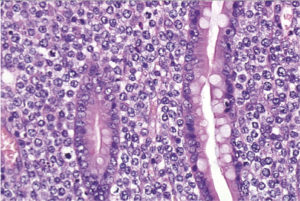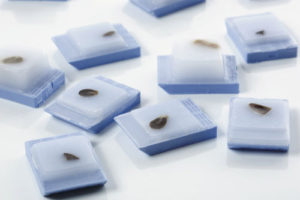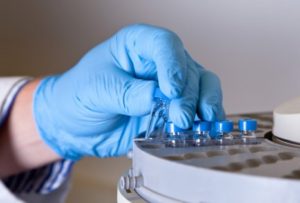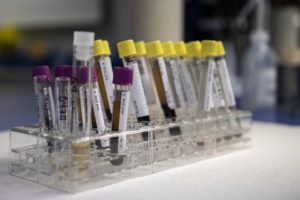Lymphoma Specimens
Bay Biosciences provides high quality, clinical grade FFPE tumor tissue block samples with matched sera (serum), plasma and peripheral blood mononuclear cells (PBMC) biofluid biofluid specimens from patients diagnosed with Non-Hodgkin’s lymphoma.
The sera (serum), plasma and PBMC samples are centrifuged from patient’s peripheral whole-blood using customized processing protocols. The human bio-specimens are collected from unique Non-Hodgkin’s lymphoma patients and provided to a valued pharmaceutical customer for research, development and drug discovery.

Lymphoma Overview
Lymphoma is a type of blood cancer that develops when white blood cells called lymphocytes grow out of control. Lymphocytes are part of the immune system, they travel around the body in the lymphatic system and blood, helping you fight infections.
There are two types of lymphocytes:
T Lymphocytes (T cells)
B lymphocytes (B cells)
Lymphoma is a type of cancer of the lymphatic system, which is part of the body’s germ-fighting network. Lymphoma begins in infection-fighting cells of the immune system called lymphocytes. These cells are in the lymphatic system which includes the lymph nodes, spleen, thymus, bone marrow, and other organs throughout the body. In patients suffering from lymphoma, lymphocytes change and grow out of control.
There are two main types of lymphoma:
-
Non-Hodgkin’s
-
Hodgkin’s
Non-Hodgkin’s Lymphoma
Non-Hodgkin’s lymphoma is cancer that originates in the lymphatic system, the disease-fighting network spread throughout the body. In non-Hodgkin’s lymphoma, tumors develop from lymphocytes which are a type of white blood cell. Non-Hodgkin’s lymphoma is more common than the other general type of lymphoma which is Hodgkin lymphoma. Many different subtypes of non-Hodgkin’s lymphoma exist. Diffuse large B-cell lymphoma and follicular lymphoma are among the most common subtypes.

Follicular Lymphoma
Follicular lymphoma is is a common type of slow-growing (low-grade) non-Hodgkin’s type of lymphoma, originating in the B lymphocytes, or B-cells, and it is the most common form of slow-growing disease, which can develop in any part of the body, causing symptoms like swollen lymph nodes. It is called ‘follicular’ lymphoma because the abnormal B cells usually develop in clumps called ‘follicles’ inside lymph nodes. Patients who suffer from Follicular lymphoma don’t usually experience strong or obvious symptoms for a long time before diagnosis due to the indolent nature of this lymphoma. The progression of the disease depends on many factors, but it is usually not a threat to patients lives until it is in an advanced stage, which can take years.
Follicular Lymphoma affects mostly the lymph nodes, like other lymphomas, and under the microscope, it shows rounded structures resembling follicles. Nearly all patients who suffer from Follicular Lymphoma have a BCL-2 mutation and translocation between the 14 and 18 chromosomes, alterations that result in abnormally high production of the BCL2 protein, which is responsible for the apoptosis or the natural life and death cycle of the cells.

Signs and Symptoms of Follicular Lymphoma
Follicular lymphoma is usually very slow-growing so signs and symptoms develop gradually over time. Many people have few symptoms and some have none at all. Sometimes follicular lymphoma is noticed during tests for a different health issue. However, follicular lymphoma can be very variable and some people might have faster-growing follicular lymphoma that causes more symptoms. Common symptoms of FL include enlargement of the lymph nodes (lumps), often, patients with Follicular Lymphoma have no obvious symptoms of the disease at diagnosis.
Enlargement of lymph nodes in the:
- Neck
- Underarms
- Abdomen
- Groin
Other symptoms include:
- Fatigue
- Fever
- Anemia
- Shortness of breath
- Night sweats
- Weight loss
- Frequent infections
- Thrombocytopenia (low platelet count)
- Neutropenia (low neutrophil count, which is a type of white blood cell)
Causes of Follicular Lymphoma
Types of Follicular Lymphoma
Most patients who have follicular lymphoma do not have a particular type. However, there are some rare variants of follicular lymphoma that behave, and are treated, differently, these include:
- Duodenal-Type Follicular Lymphoma
- Pediatric-Type Follicular Lymphoma.
Duodenal-Type Follicular Lymphoma
Duodenal-Type Follicular Lymphoma grows in the small intestine, either small bowel or the gut. It is slow growing and is usually diagnosed at an early stage. Duodenal-type follicular lymphoma is unlikely to spread (metastasize) to other parts of the body or change (transform) into a faster-growing type of lymphoma. Patients with duodenal-type follicular lymphoma might be actively observed, treated with rituximab, on its own or with chemotherapy or treated with radiotherapy. Treatment is usually very successful.
Pediatric-Type Follicular Lymphoma
Pediatric-Type Follicular Lymphoma is a very rare form of follicular lymphoma. It typically affects children but it occasionally develops in adults. It is more common in males than females. Pediatric-type follicular lymphoma most commonly develops in lymph nodes in the head or neck. It is typically diagnosed at an early stage and is usually cured with treatment. Most patients have surgery to remove the affected lymph nodes. Occasionally, some patients need radiotherapy or chemotherapy. Pediatric-type follicular lymphoma does not usually come back (relapse) after successful treatment.
Detailed clinical data, biomarker and genetic information including CBC test results, CT, biopsy, pathology annotations, associated with the patients specimens from Non-Hodgkin’s lymphoma- Follicular Lymphoma is provided to a valued customer for drug discovery, development and research.

The PBMC’s, sera (serum) and plasma biofluid samples were processed using customized processing protocols provided by the researcher. Bay Biosciences specializes in providing researchers with high quality, clinical grade customized human samples, bio-specimens and human bio-fluid collections worldwide.
Bay Biosciences is a global leader in providing researchers with high quality, clinical grade, fully characterized human tissue samples, bio-specimens and human bio-fluid collections from cancer (tumor) tissue, cancer sera (serum), cancer plasma, cancer PBMC and human tissue samples from most other therapeutic areas and diseases.
Bay Biosciences maintains and manages it’s own bio-repository, human tissue bank (biobank) consisting of thousands of diseased samples (specimens) and from normal healthy donors available in all formats and types. Our biobank procures and stores fully consented, deidentified and institutional review boards (IRB) approved human tissue samples and matched controls.
All our human human tissue collections, human specimens and human bio-fluids are provided with detailed samples associated patient’s clinical data. This critical patient’s clinical data includes information relating to their past and current disease, treatment history, lifestyle choices, biomarkers and genetic information. Patient’s data is extremely valuable for researchers and is used to help identify new effective treatments (drug discovery & development) in oncology, other therapeutic areas and diseases. This clinical information is critical to demonstrate their impact, monitor the safety of medicines, testing & diagnostics, and generate new knowledge about the causes of disease and illness.
Bay Biosciences banks wide variety of human tissue samples and biological samples including cryogenically preserved -80°C, fresh, fresh frozen tissue samples, tumor tissue samples, FFPE’s, tissue slides, with matching human bio-fluids, whole blood and blood derived products such as serum, plasma and PBMC’s.
Bay Biosciences is a global leader in collecting and providing human tissue samples according to the researchers specified requirements and customized, tailor made collection protocols. Please contact us anytime to discuss your special research projects and customized human tissue sample requirements.
Bay Biosciences provides human tissue samples (human specimens) from diseased and normal healthy donors; including peripheral whole-blood, amniotic fluid, bronchoalveolar lavage fluid (BAL), sputum, pleural effusion, cerebrospinal fluid (CSF), serum (sera), plasma, peripheral blood mononuclear cells (PBMC’s), saliva, Buffy coat, urine, stool samples, aqueous humor, vitreous humor, kidney stones, renal calculi, nephrolithiasis, urolithiasis and other bodily fluids from most diseases including cancer. We can also procure most human bio-specimens and can do special collections and requests of human samples that are difficult to find. All our human tissue samples are procured through IRB approved clinical protocols and procedures.
In addition to the standard processing protocols Bay Biosciences can also provide human plasma, serum, PBMC bio-fluid samples using custom processing protocols, you can buy donor specific sample collections in higher volumes and specified sample aliquoting from us. Bay Biosciences also provides human samples from normal healthy donors, volunteers, for controls and clinical research, contact us Now.
日本のお客様は、ベイバイオサイエンスジャパンBay Biosciences Japan またはhttp://baybiosciences-jp.com/contact/までご連絡ください。


